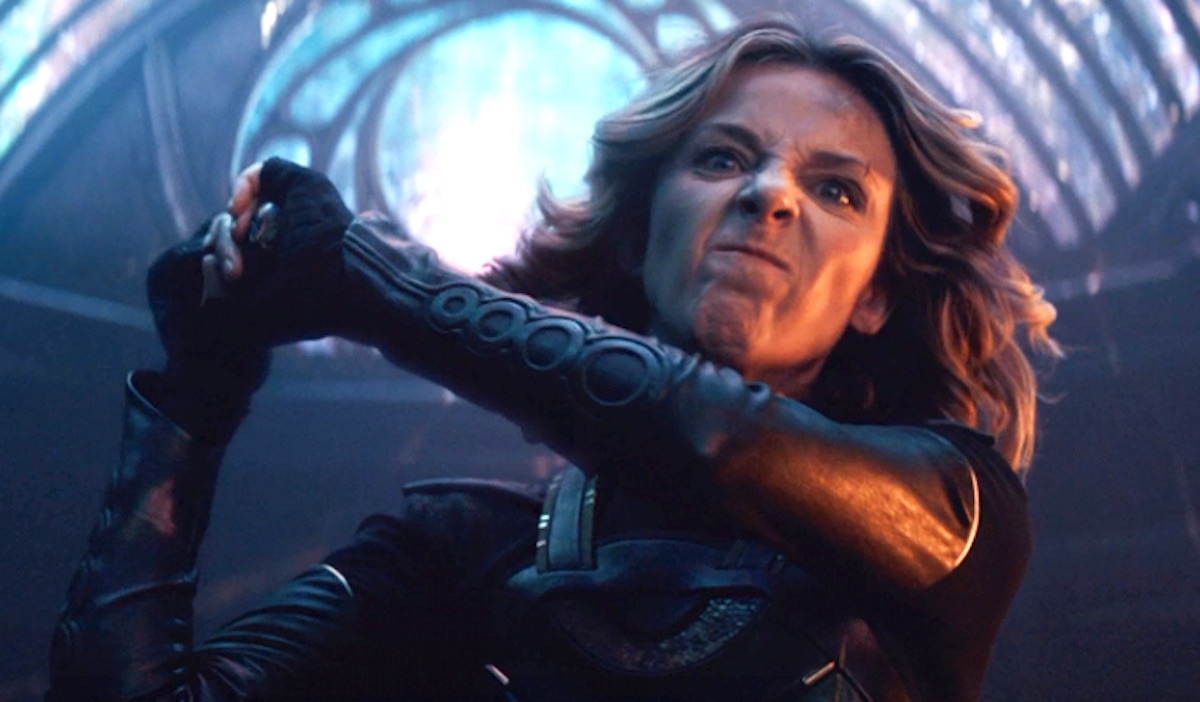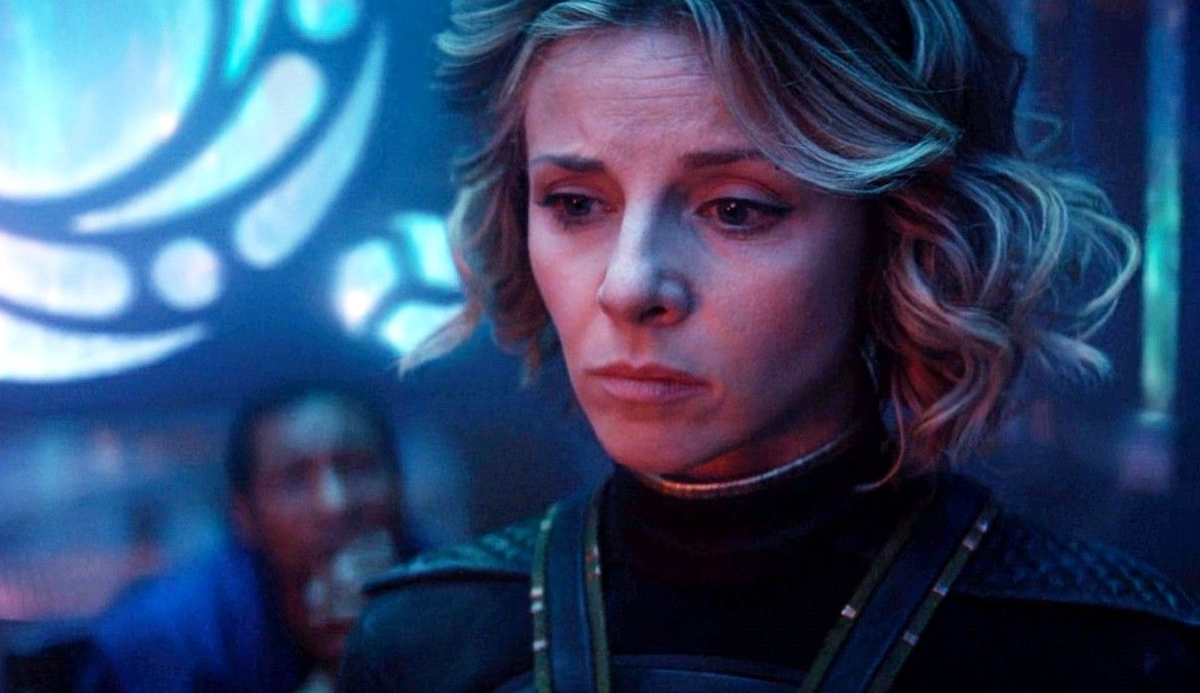An element of the Loki season one finale that hasn’t sat well with me is the impossible position the show puts Sylvie in, and the way her actions are depicted. That she would go through with her mission to avenge herself against those who hunted her since childhood was a foregone conclusion, because Jonathan Majors’ He Who Remains/Kang is going to be a major villain of Marvel Studios’ Phase 4. He—or the worse variants of him—had to be released, narratively speaking.
But episode 6 ends up framing Sylvie as the irrational one, fighting our primary Loki to achieve her goal and then seemingly making the “terrible mistake” (as Loki terms it) of letting the timelines branch and unleashing those rogue Kangs. One could argue, and some online have, that Sylvie plays the role of the “villain” here through her unswerving commitment to vengeance, helping to launch what may become a Multiversal war. At the very least, many commentators seem to think that Sylvie messed up. Yet everything we know about her and the universe as established by Loki suggests she was in the right.
The thematic message of Loki all season long has been free will vs. cruelly enforced predestination. Sylvie is exerting what she believes is her free will and, though she knows there are risks, she is also ultimately trying to bring free will back to the multiverse at large. A person who was hunted by “omniscient fascists” (as she dubs the TVA) since childhood and led a miserable existence on the run ever since should not be expected to sit quietly by and become convinced, as Loki apparently does, that a self-professed “lesser evil” dictator is a better choice than the threat of a chaotic unknown.
Loki’s message becomes muddled at the close, as our protagonist appears to advocate for maintaining the status quo that tried to eliminate him several times over. He also seems persuaded by He Who Remains’ offer to let them take over the TVA, whereas Sylvie, after her lifetime of torturous TVA experiences, wants nothing to do with running the authoritarian bureaucracy that made her life a living hell. As a reminder, we’re told that Sylvie did not have a single positive memory before meeting Loki, and even their “moment” on Lamentis-1 comes about as they think they’re about to die.
In the lead-up to the finale, “For All Time. Always,” we learn the true extent of the TVA’s depravity and brutality. First, there’s the revelation that the TVA workers are all variants themselves, snatched from their own lives and timelines and seemingly mind-wiped and brainwashed into serving as time cops. This is an unwilling workforce made to work for literal eons. Most of them don’t even have names, just numerical designations. Do they get paid? Do they have lives outside of their duties? Do they have downtime? Unclear!
What should be clear is that even if Sylvie and Loki accepted the offer to run the TVA more humanely—and if that offer was even genuine—there’s no indication that it could continue to function. At all. Mobius and Hunter B-15, the most hardcore of TVA cheerleaders and enforcers, turned their back on it the moment they learned who they really were. Hunter C-20’s entire brain was scrambled by getting to experience a memory from her old life. Are we supposed to believe that the TVA workers would continue in their roles if the truth was revealed? If they didn’t, it would be up to Loki and Sylvie to force them to comply.
And what about the TVA’s overall mission and the results they produce?
We discover in “Journey Into Mystery” that the people and timelines that are “pruned” are not actually immediately destroyed, but are instead transferred into The Void, a horrific place that Classic Loki describes as a “shark tank.” There, countless innocent pruned folks are hunted and consumed by the monstrous Alioth. If they manage to stay alive, they must endure a vicious, hardscrabble environment where people will betray their friends for food—and cannibalistic pirates apparently turn others into food. Even Alioth appears to be a victim of He Who Remains, a creature experimented upon until he reached this awful form.
Again, The Void is where blameless people are sent simply because He Who Remains believes a single “Sacred” timeline is preferable. And that timeline was isolated and enforced by a Kang variant after other Kang variants caused so much violence that this presented as the only stable “solution.” It seems to me that the problem isn’t free will or multiple timelines and worlds, but Kang himself.
All of the threatened destruction He Who Remains foretells to follow his “death” will come about, he says, because the other versions of him are even worse. Like a textbook autocrat, He Who Remains suggests that he alone can fix things, that he alone is the key. “I keep you safe,” he tells Loki and Sylvie, and then the threat: “And if you think I’m evil, well, just wait till you meet my variants.” He Who Remains is entirely self-aware of what he and his fascist time bureaucracy stand for, suggesting that the “gambit” is “Stifling order or cataclysmic chaos.”

What Sylvie chooses not to elect for is that “stifling order” that has kept her and so many others crushed underfoot. Loki may think He Who Remains is telling the truth, and maybe He Who Remains is doing so from his perspective, but Sylvie refuses to accede to He Who Remains’ maxim that “You may hate the dictator, but something far worse is gonna fill that void if you depose of him.” She does hate the dictator, and the threat of something worse rings hollow after all that she’s suffered. At least by getting rid of the dictator, there’s the chance of achieving a different outcome eventually.
Every dictator since the dawn of time has said something similar to He Who Remains’ declaration. We aren’t meant to think they should stay in power just because of the possibility of an unknown power vacuum thereafter. Sometimes a little cataclysmic chaos and uncertainty are necessary before a better system of living can emerge.
The people who think she did wrong are subconsciously (or maybe not) Authoritarian. Trillions of lives are stolen through pruning. What’s the upside? Literally just order and normalcy.
— Jefferson (@fergeaux) July 17, 2021
He Who Remains’ so-called “gambit” is authoritarianism 101. In his 1941 book Escape from Freedom, psychologist Erich Fromm described the enduring human fear of chaos and instability that often leads to people sacrificing their freedom for the promise of security and stability. As The Guardian writes in an article on how authoritarians thrive on fear:
The gist of it is this: when people perceive an increase in disorder, they feel tremendous anxiety. Inevitably, this anxiety leads to a quest for security. To bring a sense of safety back into their lives, they latch on to authoritarianism and conformity. As Fromm noted, this often leads to “a readiness to accept any ideology and any leader if only he offers a political structure and symbols which allegedly give meaning and order to an individual’s life”. He had observed this in Germany, which he fled in 1933: “Modern man still is anxious and tempted to surrender his freedom to dictators of all kinds,” he wrote.
He Who Remains succeeds in making Loki so afraid of the potentials of disorder that Loki is willing to accept that He should remain in place—or even that Loki might follow after him and provide his own brand of structure. Sylvie isn’t having it. She would rather take on the threat in front of her, the one she knows is responsible for untold misery and suffering, rather than be persuaded that something worse simply must emerge in his wake.
We can argue that what Loki was really advocating for was more time to think through the situation and not do anything too quickly. But the whole scenario was structured by He Who Remains as a ticking clock. And one of the biggest problems with the muddled confusion of the season’s end is that He Who Remains is such an unreliable narrator. We only have his word that eliminating him and freeing the other timelines is the worst decision Sylvie and Loki can make. As we’ve established, that’s exactly what an entrenched autocrat utterly convinced of their own necessity would say.
On Twitter, Kinda Funny host and producer Blessing Adeoye Jr. has a thread that perfectly encapsulates my feelings where Sylvie is concerned:
Sylvie did nothing wrong.
Feel free to discuss in the replies to this tweet. #Loki pic.twitter.com/Yv80hT6KYx
— Blessing Adeoye Jr. (@BlessingJr) July 17, 2021
For real though, #Loki spoilers to follow.
I’ve seen enough people say that she pulled a “Star Lord” and I’m like… Did we watch the same thing?
Because what she did actually:
1) Saved a bunch of timelines
2) Established free will— Blessing Adeoye Jr. (@BlessingJr) July 17, 2021
She may have unleashed a huge threat along the way, but if/when that threat is defeated, it’s a net positive. Free will, no more pruned timelines, a dope Spider-Man movie. What she did was absolutely necessary.
— Blessing Adeoye Jr. (@BlessingJr) July 17, 2021
I love the idea that after the dust has settled on all that Marvel has planned for the future, what Sylvie did will be a “net positive.” And in response to someone asking if Adeoye would still feel the same way if we didn’t know that Kang would one day be defeated:
Yes. Mainly from the standpoint that He Who Remains has been pruning every other timeline anyway. Including Sylvie’s. For her that’s worth the vitriol, and even worth the risk imo.https://t.co/LiWgMP3oBU
— Blessing Adeoye Jr. (@BlessingJr) July 17, 2021
While it may seem that Sylvie acts rashly, what she does is actually a culmination of a lifetime of careful planning. What I really don’t want to see in future seasons on Loki or if she makes appearances in the movies is Sylvie made to “atone” for her actions. The show, in framing Sylvie’s choice as more of a “wrong” decision, implies that the MCU may blame her going forward. But I think her unswerving commitment to free will and not being convinced by the arguments of a despot are a much more powerful takeaway than Loki would have us believe.
(images: Marvel Studios)
Want more stories like this? Become a subscriber and support the site!
—The Mary Sue has a strict comment policy that forbids, but is not limited to, personal insults toward anyone, hate speech, and trolling.—










Published: Jul 22, 2021 06:12 pm